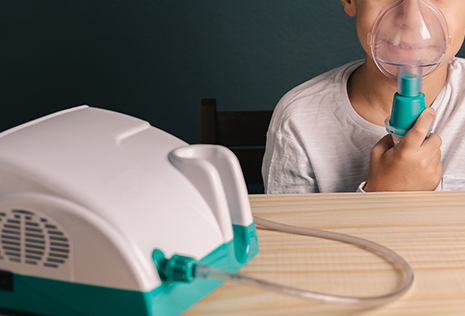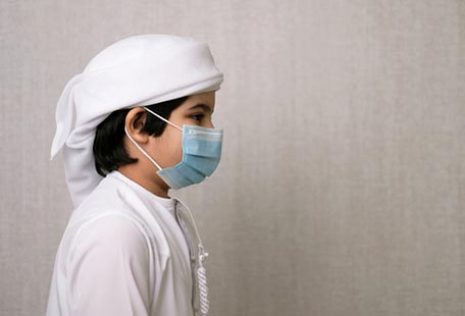Pediatric Asthma

 What is Asthma?
What is Asthma?
 Asthma is a disease that
affects the airways in the
lungs. The airways are tubes
that carry air in and out of the
lungs.
Asthma is a disease that
affects the airways in the
lungs. The airways are tubes
that carry air in and out of the
lungs. If patients have asthma, the
airways can become
inflammed and narrowed at
times.
If patients have asthma, the
airways can become
inflammed and narrowed at
times.
 What causes asthma
in children?
What causes asthma
in children?
 After a child is exposed to a
certain trigger, the body
releases histamine and other
agents that can cause
inflammation in your child’s
airways.
After a child is exposed to a
certain trigger, the body
releases histamine and other
agents that can cause
inflammation in your child’s
airways. The body also releases other
factors that can cause the
muscles of the airways to
tighten, or become smaller.
There is also an INCREASE
in mucus production that may
clog the airways.
The body also releases other
factors that can cause the
muscles of the airways to
tighten, or become smaller.
There is also an INCREASE
in mucus production that may
clog the airways.


 WHAT ARE THE SYMPTOMS OF ASTHMA?
WHAT ARE THE SYMPTOMS OF ASTHMA?
 Wheezing
(whistling
sound) when breathing
Wheezing
(whistling
sound) when breathing- Coughing
 Rapid breathing
Rapid breathing Labored breathing
Labored breathing Complaints of chest
hurting
Complaints of chest
hurting Reduced energy
Reduced energy Feeling weak or tired
Feeling weak or tired
 Who is at risk of developing asthma?
Who is at risk of developing asthma?
Asthma affects people of all ages and often starts during childhood.
It is most commonly occurs in:
 Children by the age of 5
Children by the age of 5 Child with a family history of asthma
Child with a family history of asthma Children who have allergies
Children who have allergies Children who have exposure to
secondhand tobacco smoke
Children who have exposure to
secondhand tobacco smoke
 What are the triggers that can cause
an asthma attack?
What are the triggers that can cause
an asthma attack?
 Allergens: Pollen, Mold, Certain foods
Allergens: Pollen, Mold, Certain foods Respiratory Infections and Sinusitis: Infections can cause irritation of the
airways, nose, throat, lungs, and
sinuses, and worsens asthma.
Respiratory Infections and Sinusitis: Infections can cause irritation of the
airways, nose, throat, lungs, and
sinuses, and worsens asthma. Irritants: Strong odors and sprays,
chemicals, air pollutants, changing
weather conditions.
Irritants: Strong odors and sprays,
chemicals, air pollutants, changing
weather conditions. Sensitivity to Medications as aspirin,
sulfites
Sensitivity to Medications as aspirin,
sulfites Exercise
Exercise Gastroesophageal reflux
Gastroesophageal reflux Smoke
Smoke Emotional Anxiety and Nervous Stress
Emotional Anxiety and Nervous Stress
 Managing asthma in children
Managing asthma in children
 The child's doctor will determine which asthma medication is best based on
the severity and frequency of symptoms and the child's age.
The child's doctor will determine which asthma medication is best based on
the severity and frequency of symptoms and the child's age.
 How do WE treat Asthma
How do WE treat Asthma
 Short-term reliever
medicines
Short-term reliever
medicines
Short-term reliever medicines, also called quick-reliever medicines, help prevent symptoms or relieve symptoms during an asthma attack. They may be the only medicines needed for mild asthma or asthma that happens only with physical activity.
These medications are taken only on an as-needed basis.
Types:
- Inhaled short-acting beta2-agonists: (SABAs) to quickly relax tight muscles around your airways.
- Oral and intravenous (IV):
- corticosteroids to reduce inflammation caused by severe asthma symptoms.
- Short-acting anticholinergics to help open the airways quickly. Most commonly used is Albuterol.
 controller medicines
controller medicines
Doctors may prescribe long-term control medicines to take daily to help prevent symptoms by reducing airway inflammation and preventing narrowing of the airways.
Include:
- Corticosteroids to reduce the body’s inflammatory response.
- Leukotriene modifiers to reduce inflammation and keep your airways open.
- Mast cell stabilizers to help prevent airway inflammation when you are exposed to allergens or other triggers.
- Inhaled long-acting bronchodilators such as long-acting beta2-agonists (LABAs), to keep the airways open by preventing narrowing of the airways.
- Methylxanthines to treat acute exacerbations of asthma.
- Omalizumab injection to treat moderate to severe asthma patients whose asthma is poorly contolled with inhaled cotricosteroids and inhaled long acting β2 agonist bronchodilators.
 Emergency care
Emergency care
If patients have a severe asthma attack and need emergency care, they may be treated with medicines, such as those listed before, given with a nebulizer or IV.
Patients may also receive oxygen therapy or breathing assistance. This may include ventilator support or through a mask with forced air.
 How to live with asthma?
How to live with asthma?
 All of the people who care a child should know about the child's asthma action plan. These include family
members, child care providers, schools, camps, team coaches, and instructors. In an emergency, these
people can help the child follow their asthma action plan.
All of the people who care a child should know about the child's asthma action plan. These include family
members, child care providers, schools, camps, team coaches, and instructors. In an emergency, these
people can help the child follow their asthma action plan.
Useful Material
CONNECT WITH THE LEADERS IN THE SOCIETY














